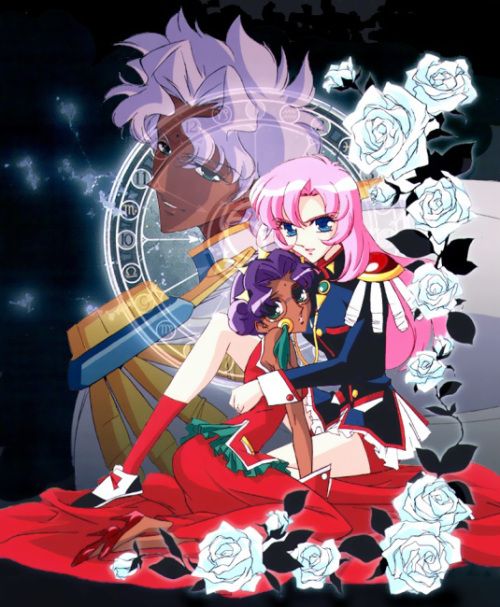
Title: Revolutionary Girl Utena
Language: Japanese
Genre: Drama, Fantasy, Shoujo, Psychological
Episodes: 39
I've finally come to the conclusion of shoujo anime I was introduced to when I first got into it by one of my best friends. If you missed it, it consisted of DiGi Charat, Angelic Layer, and both seasons of Magic Knight Rayearth. Revolutionary Girl Utena is my final entry to this list, if I don't decide to write up a full review for DiGi Charat, and soon I'll be embarking on my second set of unfinished anime series which contains series that I was introduced to by her or shows that came on Cartoon Network's Toonami and Adult Swim. I'll be rewatching some series as well to possibly contribute to Throwback Thursday posts. Now, let's get into the review!
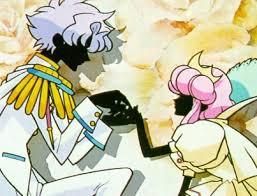
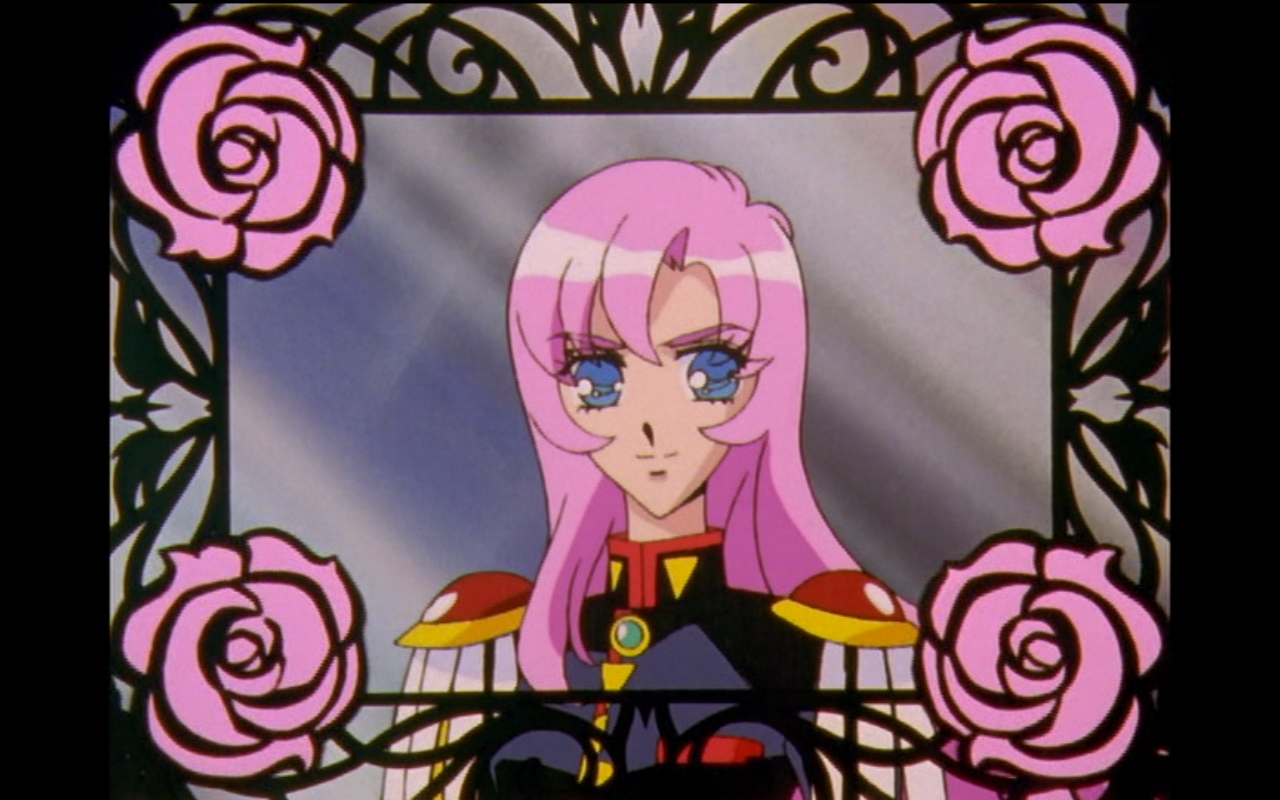
Just after Utena's parents died she was consoled by a prince who gave her a ring with a rose crest on it. Utena was so impressed by the Prince that she vowed to become one herself one day. A few years later Utena is attending Ohtori Academy where she gives all the teachers headaches because she dresses in a boys uniform so she can be like the prince she met long ago.
After Utena's friend is insulted by a member of the Student Council, Utena fights in a duel for her friends honor. Utena's rose crest allows her to enter the dueling arena where Utena wins the duel and becomes engaged to the Rose Bride. Unknowingly, Utena is pulled into a series of duels with other members of the Student Council for the possession of the Rose Bride. As she becomes fond of Anthy, the Rose Bride, she must fight to keep her friend safe and to discover the horrifying secret behind Ohtori Academy. [Source: MyAnimeList]
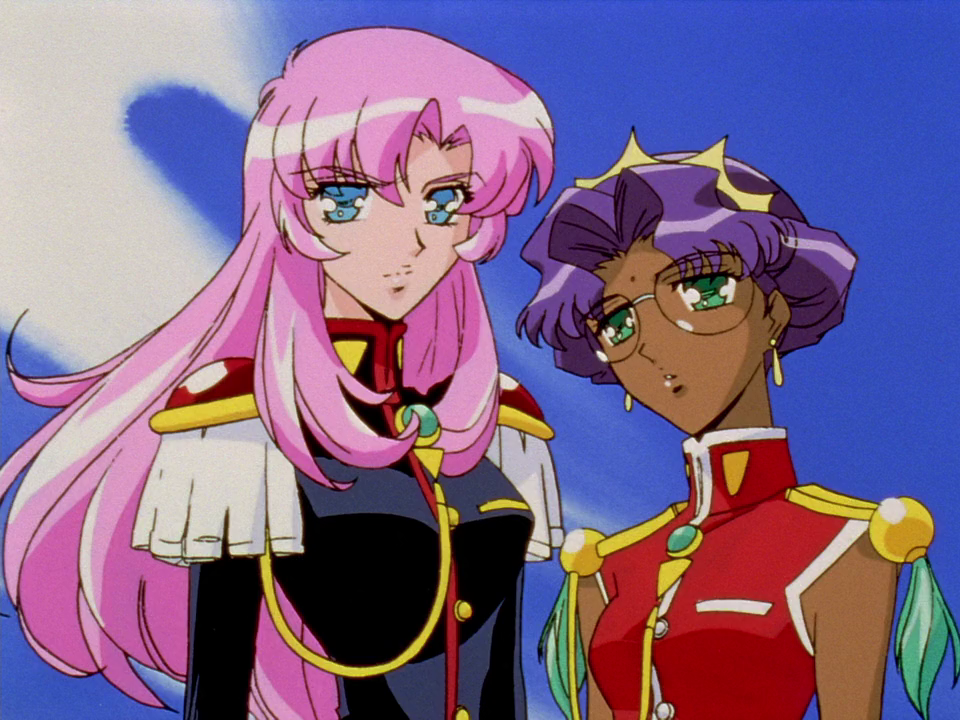
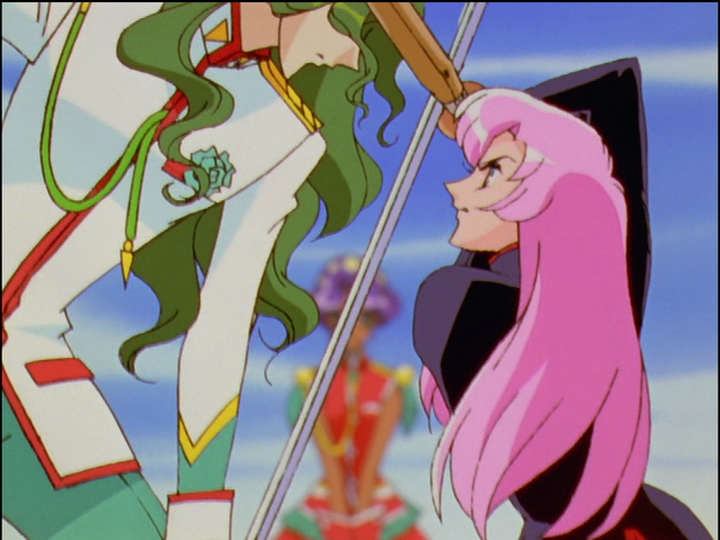
I wish I could remember why I never finished this show years ago, but honestly, I don't think I would've appreciated or even understood the complexities of this show. While building up to adding this to my anime rotation, Utena related posts and cosplays would pop up in my friends circle. Before starting the show, I tried to prod as much information as I could from my past viewing. While watching each episode, I've concluded that I remember vague elements I've seen and heard such as rose symbols, Utena wanting to be a prince, surface information on her relationship with Anthy, the duals, and possible incestual relationships between some characters. Mostly, I confirmed that I wasn't experiencing another moment of replay like when I finished Magic Knight Rayearth season 1. I definitely never finished this series, so I was excited to see where this story would take me.
Among these 39 episodes are several story arcs. Each arc does contain its own storyline and end goal, but at the same time contributes to the overall story. I must say I don't know how kids would be able to fully get into this show because of the story. On the surface, it provides a simple goal, although said goal can be vague at times. Utena wants to become a prince, she wants to protect her friend Anthy from harm and the dueling rules, and ultimately she wants to meet her prince that saved her as child when her parents passed. The way the show goes about these goals is very intricate, smart, and complex. The characters often make use of this serious and kinda vague dialogue. Some of their words paint this bleak future of finality or destruction and I often times found myself wondering: what is their purpose...specifically in blunt terms. There's all this talk of End of the World and revolutionizing the world, but I don't think, even after watching, that I completely understand their ultimate purpose. Please feel free to help me along in the comments below. Certain parts I did understand when it came to smaller objectives such as Nanami's attention seeking ways around her brother and Akio's interactions with Utena...to an extent. Of course, the complexities kept me watching for answers as well as the theatrical presentation it had visually. In the end, it made me want more to understand what's going on. Maybe rewatching the series, rereading Wikipedia, or giving an alternate story through the movie adaptation might paint a clearer picture for me.
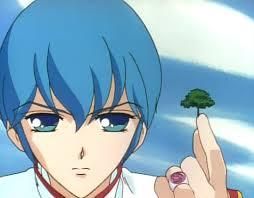
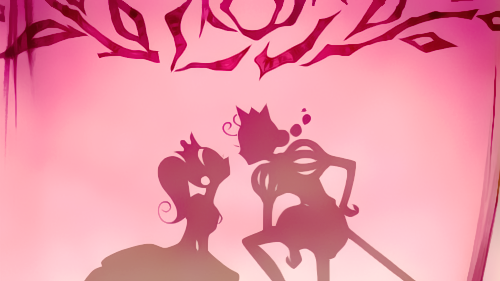
So, what about the characters? Well, some characters you're going to immediately have feelings for, while others you're still trying to figure out and become neutral towards for quite some time. Utena is naturally an interesting character. She is a good representation for a strong female lead. She feels that conflict of falling into that well known cliche of women wanting to be sweet little princesses and waiting to be swept away and taken care of by Prince Charming. That's a black and white interpretation of it, but personally I kinda understand her plight to some extent. Anthy, on the other hand, takes some adjusting to. While I instantly liked her, I did have some frustrations with her submissive and pliable personality or even how she tends to hide her traits to fit others' needs. As for the supporting characters, I found that the story gave them plenty of diversity and I enjoyed how their backstories unfolded when the timing was right. Those historical presentations usually cemented my feelings toward a lot of the supporting characters. Juri and Kozue brought sympathy from their unstable relationships, Touga made wonder about his intentions with Utena and Nanami, and Nanami just made me dislike her even more. In the end, it is important to know as much as possible about these characters and their motives as they all intersect in the grand scheme that is Akio.
Shortly, I want to talk about the artwork. Since this show came out in 1997, it definitely has that 90s anime look to it, which isn't a bad thing. The character designs have a slightly unique look, especially when it comes to hair and eye colors. Occasionally, their eyes can seem a bit frightening due to lack of detail, but it works. The highlights of the art are the set designs, especially the transition to and actions in the dueling scenes and the silhouette/shadow puppet scenes. The dueling scenes are very dramatic, elegant, and flow well with the other scenes presented in the show, even if the dueling stage features some strange props. The silhouette/shadow puppet scenes are interesting and often times offer comical narrations of what's going on in the moment. Most of the time, they make sense with what's going on and other times they seem like pure entertainment moments. It does tie in with the style of Takarazuka theater and fits in well with the sophisticated and beautiful style of the rest of the show.
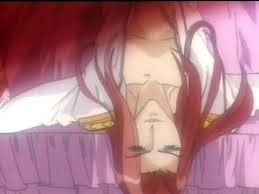
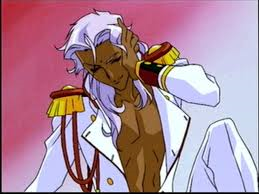
I know this review is getting quite lengthy, but there's just a few more things I want to mention. As much as I enjoyed this series, I did have some confusion, if that wasn't obvious with my word choices above. Some elements of this show, as I said before, can be complex and a bit vague. I never completely understood the motivation for The End of World and part of Akio's grand scheme. Parts of the Black Rose Saga arc made me question things, but I believe I understood majority of what the arc had to offer. The most confusion is in the final arc, Apocalypse Saga, and trying to piece together Touga's change of action and Akio and Anthy's history. In the end, I feel like there are probably some hidden meanings or even symbolism embedded throughout the series, but it most likely requires repeated viewing and possibly additional resources or even alternate material through either the manga or movie.
I am happy that I decided to return to Revolutionary Girl Utena and complete it. Even though I found myself raising my brow in confusion at moments, I thought the story was intriguing and entertaining. It has a good balance of drama, action, comedy, and a bit of "unconventional" romance. I'd like to believe that this series was probably revolutionary for its time, presenting new ideas of gender and sexual attraction. Even though the art screams 90s, the content does carry on effortlessly through time and doesn't feel that dated in my eyes. I highly recommend this series to (mature) anime enthusiasts out there and those who are getting into anime.
If there's something you want me to review, check out this post on how you can submit requests.

No comments:
Post a Comment